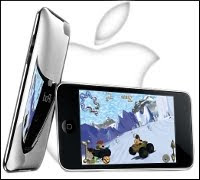
Apple's iPod Touch, introduced in late 2007 as essentially an iPhone minus the phone part, has quietly grown to prominence as a platform for more than just music playback and is changing the landscape for mobile devices.
While Apple (NASDAQ: AAPL) has frequently discussed the App Store by mentioning both the iPhone and iPod Touch together, the iPhone has typically stolen the spotlight thanks to the dynamic effect it had on the smartphone market, where it remains one of the industry's hottest sellers. Now it seems that the iPod Touch plays a much greater role for those 100,000 App Store apps than previously believed.
Flurry, a San Francisco-based mobile analytics company, said in a blog post that of the 58 million iPhone OS devices sold worldwide through September, the iPod Touch (sometimes called "iTouch") represents 40 percent of the market, with 24 million units sold.
At the most recent iPod event, which featured the public return of Apple's CEO Steve Jobs, the company's chief executive disclosed that Apple has sold 220 million iPods worldwide. So the iTouch's 24 million units is only about one-tenth of the total sold. Then again, iPod has been on the market since 2001 and the iTouch is a relative newcomer.
In that time, though, Flurry has noted how deeply it has dug into people's lives, particularly young users.
"Apple is using the iPod Touch to build loyalty with pre-teens and teens, even before they have their own phones (think: McDonald's Happy Meal marketing strategy,)" Peter Farago, vice president of marketing for Flurry, said in the blog post. "When today's young iPod Touch users age by five years, they will already have iTunes accounts, saved personal contacts to their iPod Touch devices, purchased hundreds of apps and songs, and mastered the iPhone OS user interface. This translates into loyalty and switching costs, allowing Apple to seamlessly 'graduate' young users from the iPod Touch to the iPhone."
"For OEMs hoping to challenge Apple, we believe an even greater sense of urgency must be adopted," he added.
Anecdotally, Farago said he's noticed a shift in usage habits by his friends' children.
"What I was seeing with friends who have kids between 7 and 12 is all the boys had a Nintendo DS for years. Now I'm noticing it seemed like they don't have Nintendo any more, they have an iPod Touch. Their parents are like, 'Please, 99 cent games or a $30 cartridge? I don't have to go to the store and I can control how much they spend?' ... It's a no-brainer," he told InternetNews.com.
All that invested content and data on the Apple device gets them early and locks them in, he added.
"Just that alone makes the iPhone/iTouch very sticky," Farago said. "All the content you can own and can use again with a new device is also appealing."
It's a great reinvention for the iPod, a which began as a simple music playback device. Some pundits predicted Apple would kill off the iPod Classic, which is the only unit left that uses a hard drive instead of Flash memory, but so far it hangs in there.
More than that, though, the iPhone and iTouch may be greasing the skids for Apple's long-rumored iTablet, iPad, or whatever the tablet device might be called.
The general consensus among the rumormongers is that it's a 10- to 12-inch pad that operates like an iTouch, with some form of wireless support. But unlike the iPod Touch and iPhone, Apple tablet apps could run in windows, and it might support multiple apps simultaneously -- if the rumors are to be believed.
At the very least, Farago said, the iPhone and iPod Touch remain valuable stepping stones to even more advanced Apple products.
"If you think about just the user interface learning Apple has gotten out of iTouch and the iPhone, a lot of that is very transferable," Farago said. "For Apple, it's been extremely valuable to see how users to interact with this thing and they are also training users on [the use of] touch."source


Your blog is very informative and gracefully
ReplyDeleteyour guideline is very good.Thank you
iphone application development
web & mobile application development company india
mobile application development
ipad application development
android application development
web design & development company india
Your blog is very informative and gracefully
ReplyDeleteyour guideline is very good.Thank you
iphone application development
web & mobile application development company india
mobile application development
ipad application development
android application development
web design & development company india